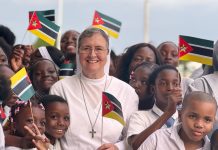Madrid (Spain). On 12 April 2024, in Madrid, at the headquarters of Saint James the Greater Province (SSM) of the Salesians of Don Bosco, the second edition of the “Dialogues of Youth Ministry” on the theme, “Pastoral in the metaverse: Artificial Intelligence vs Pastoral Intelligence” took place. It was organized by the National Center for Salesian Youth Ministry of Spain, in coordination with the Salesian publishing house “Central Catequética Salesiana” (CCS).
The day was addressed to teachers and formators in the field of education, educators, accompanists of young people in leisure time platforms, catechists and animators of the paths of education to the faith, as well as educators active in other educational fields. Present was Sister Herlinda Palomino, Daughter of Mary Help of Christians, a collaborator of the Youth Ministry Department of the FMA Institute.
The meeting included interventions by personalities of the sector, including Jaime Tatay, Jesuit, Professor at the Pontifical University of Comillas; Juan Ramón Lara, priest of the Diocese of Barcelona; José Fernando Juan, Professor of philosophy and educator at the Marianists in Madrid; Carmen Pellicer, theologian, pedagogue, and president of the Trilema foundation; Francisco Javier Valiente, SDB, journalist and Salesian delegate for Communication of Spain.
The theme of Artificial Intelligence poses many challenges to Pastoral Ministry and, through this and other meetings, intends to discuss technological immersion and transhumanism in the perspective of Christian anthropology; reflect on the challenges of Artificial Intelligence regarding educational and pastoral action; and design ethical issues related to the development of AI, with particular attention to the world of youth.
The virtual world and artificial intelligence involve a dimension of inevitable conflict, but also of dialogue, and require a discernment to know when to use them and when to proceed with caution. As standard users, we do not know the algorithms behind AI, nor the criteria that govern the economic and commercial choices or interests behind it. For this reason, it is necessary to become literate ourselves and make the Educating Communities literate on these issues.
The development of AI raises many ethical questions. The first – and most obvious – may be the question of truth, of all the information that is “consumed” every day, that questions what is real and what is not.
Who is the human being, an infallible and perfect being like machines? What is essential in the use of social networks? How to respond to the search for meaning? How to arouse amazement in this society of immediacy and consumerism? How to educate to freedom when the networks push to alienation? One could continue with the questions. However, as Christians, it is also possible to offer answers.
The human being is limited and vulnerable and these innate characteristics allow to open oneself to a much greater reality, to transcendence. We are not called to live as infallible beings. We are called to live according to our inalienable dignity, as a child loved by God. The essential in digital communication must be expressed in love for God and neighbor, therefore social networks can and must be spaces of gratuitousness, expectation, and acceptance of limitations. It is also essential to conceive of the digital environment as a place to create culture. The great responsibility of every believer is therefore to permeate AI with Christianity, having clear the purpose of its presence in the networks; that is, to indicate the direction, to give meaning so as not lose ourselves in media excess.
Intentionality, when it deals with being present in the digital world, is very important. It is urgent to reawaken the desire to live and to “live well”. This implies educating to make decisions, “to choose the good”. We must also take care of the form, because ‘how’ it is communicated is as important as ‘what’ is communicated. For the Christian, this is not negotiable: truth, goodness, and beauty are communicated.
Digital tools have many advantages. First of all, they can greatly speed up mechanical work, much easier data collection, analysis, and preparation of statistics that support decision making. They can shorten distances and facilitate listening, dialogue, and meeting; encourage teamwork and online formation, without replacing, of course, personal meetings. There are also many instruments that facilitate the research and development of the resources necessary for pastoral work.
In the great metaverse, only the human being can relate with critical and creative judgment, imbuing it with meaning and truth. Entering into dialogue with AI is therefore not an option, but a reality that must be chosen, and must be lived with love and authenticity.























Gracias por compartir. Reso por la linda iniciativa de Animar pastoralmente… El Reino de Cristo crece con Esperanza un abrazo Sor Aida